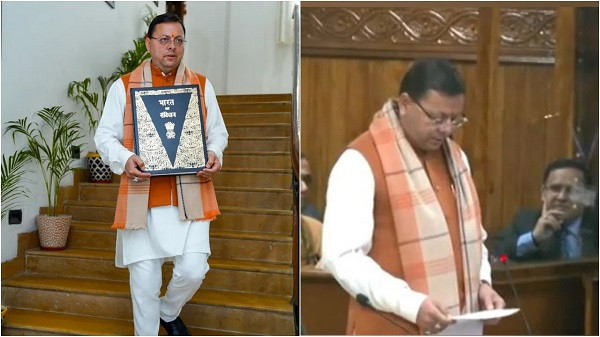By Akanksha Raj
On Tuesday, Chief Minister Pushkar Singh Dhami submitted the contentious legislation in the House.
Dehradun: On Wednesday, the Uttarakhand Assembly passed the Uniform Civil Code bill, which promises to replace religious personal laws governing marriage, relationships, and inheritance. On Tuesday, Chief Minister Pushkar Singh Dhami accepted the contentious legislation in the House.
Uttarakhand has become the first state in India to implement a law according to the Uniform Civil Code.
Dhami commented that the draft of the law had been developed in conformity with the Constitution.
“After independence, the creators of the Constitution granted the right under Article 44 to the states to establish the UCC at the appropriate moment… People have concerns about this. “We created the draft using the constitutional system,” he stated in the assembly.
The Bharatiya Janata Party’s essential promise in the Uttarakhand Assembly election manifesto for 2022 was to enact the Uniform Civil Code.
Assam’s chief minister, Himanta Biswa Sarma, announced that his state will be the second to execute the law.
What refers to the Uniform Civil Code Bill?
The bill proposes major changes to the institution of marriage and similar relationships. The legislation’s most important feature is that it requires the registration of live-in couples.
According to the bill, live-in relationships must be registered within one month of entering the relationship. Adults will be needed to seek parental consent.
The bill further bans marriage between minors and establishes a consistent divorce process. The Code gives women of all religions similar rights to their ancestral property.
The measure established the minimum marriage age in all communities: 18 for women and 21 for males.
Marriage registration is a requirement in all religions. Unions that are not registered will be ruled null.

Muslim bodies reject the bill.
Leading Muslim organizations have raised concerns about the code.
“Fundamentally, there is no value of such a Uniform Civil Code (UCC) when you yourself state that certain localities will be exempt from the Act. So where is the uniformity? UCC means that the same rules apply to all citizens of the state,” Khalid Rashid Farangi Mahali, executive committee member of the All India Muslim Personal Law Board, told PTI.
The Jamiat Ulema-e-Hind said Muslims will not be able to compromise on Shariah.
“We cannot accept any law that is towards Shariah because a Muslim is able to compromise with every requirement, but he or she can never compromise on Shariah and religion,” according to the organization.
Owaisi criticizes planned UCC law.
AIMIM president Asaduddin Owaisi stated today that the measure includes the Hindu undivided family.
“The Uttarakhand UCC Bill is simply a Hindu Code that applies to everyone. First and foremost, Hindu undivided households have been harmed. Why? If you want a consistent law for succession and inheritance, why exclude Hindus? “Can a law be uniform if it does not apply to the majority of your state?” he said on X.
He also complained to the bill’s excluding of tribal members.
He pointed out that the bill violated the Muslim community’s rights to conduct religion and culture.


Hallie Richardson